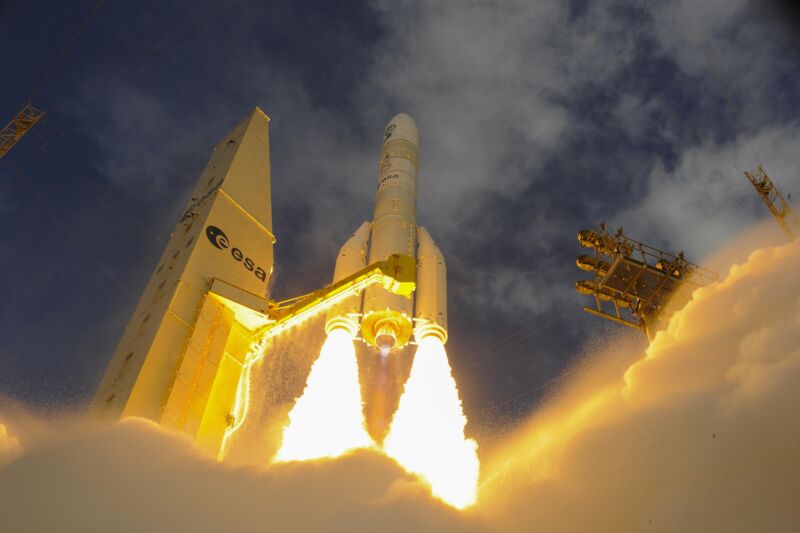Rocket Report: Chinese firm suffers another failure; Ariane 6 soars in debut

Welcome to Edition 7.02 of the Rocket Report! The highlight of this week was the hugely successful debut of Europe’s Ariane 6 rocket. They will address the upper stage issue, I am sure. Given Europe’s commitment to zero debris, stranding the second stage is not great. But for a debut launch of a large new vehicle, this was really promising.
As always, we welcome reader submissions, and if you don’t want to miss an issue, please subscribe using the box below (the form will not appear on AMP-enabled versions of the site). Each report will include information on small-, medium-, and heavy-lift rockets as well as a quick look ahead at the next three launches on the calendar.

Chinese launch company suffers another setback. Chinese commercial rocket firm iSpace suffered a launch failure late Wednesday in a fresh setback for the company, Space News reports. The four-stage Hyperbola-1 solid rocket lifted off from Jiuquan spaceport in the Gobi Desert at 7:40 pm ET (23:40 UTC) on Wednesday. Beijing-based iSpace later issued a release stating that the rocket’s fourth stage suffered an anomaly. The statement did not reveal the name nor nature of the payloads lost on the flight.
Early troubles are perhaps to be expected … Beijing Interstellar Glory Space Technology Ltd., or iSpace, made history in 2019 as the first privately funded Chinese company to reach orbit, with the solid-fueled Hyperbola-1. However the rocket suffered three consecutive failures following that feat. The company recovered with two successful flights in 2023 before the latest failure. The loss could add to reliability concerns over China’s commercial launch industry as it follows Space Pioneer’s recent catastrophic static-fire explosion. (submitted by EllPeaTea)
Feds backtrack on former Firefly investor. A long, messy affair between US regulators and a Ukrainian businessman named Max Polyakov seems to have finally been resolved, Ars reports. On Tuesday, Polyakov’s venture capital firm Noosphere Venture Partners announced that the US government has released him and his related companies from all conditions imposed upon them in the run-up to the Russian invasion of Ukraine. This decision comes more than two years after the Committee on Foreign Investment in the United States and the US Air Force forced Polyakov to sell his majority stake in the Texas-based launch company Firefly.
Not a spy … This rocket company was founded in 2014 by an engineer named Tom Markusic, who ran into financial difficulty as he sought to develop the Alpha rocket. Markusic had to briefly halt Firefly’s operations before Polyakov, a colorful and controversial Ukrainian businessman, swooped in and provided a substantial infusion of cash into the company. “The US government quite happily allowed Polyakov to pump $200 million into Firefly only to decide he was a potential spy just as the company’s first rocket was ready to launch,” Ashlee Vance, a US journalist who chronicled Polyakov’s rise, told Ars. It turns out, Polyakov wasn’t a spy.
Pentagon ICBM costs soar. The price tag for the Pentagon’s next-generation nuclear-tipped Sentinel ICBMs has ballooned by 81 percent in less than four years, The Register reports. This triggered a mandatory congressional review. On Monday, the Department of Defense released the results of this review, with Under-secretary of Defense for Acquisition and Sustainment William LaPlante saying the Sentinel missile program met established criteria for being allowed to continue after his “comprehensive, unbiased review of the program.”
Trust us, the military says … The Sentinel project is the DoD’s attempt to replace its aging fleet of ground-based nuclear-armed Minuteman III missiles (first deployed in 1970) with new hardware. When it passed its Milestone B decision (authorization to enter the engineering and manufacturing phase) in September 2020, the cost was a fraction of the $141 billion the Pentagon now estimates Sentinel will cost, LaPlante said. To give that some perspective, the proposed annual budget for the Department of Defense for its fiscal 2025 is nearly $850 billion. (submitted by EllPeaTea)
https://arstechnica.com/?p=2036368